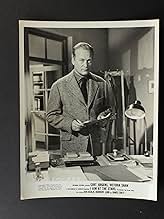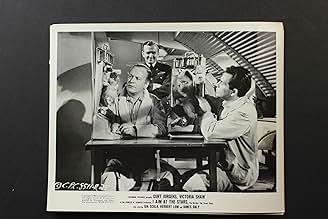PUNTUACIÓN EN IMDb
6,2/10
301
TU PUNTUACIÓN
Añade un argumento en tu idiomaThe story of rocket scientist Dr. Werner von Braun's career, from the 1920s until the late 1950s.The story of rocket scientist Dr. Werner von Braun's career, from the 1920s until the late 1950s.The story of rocket scientist Dr. Werner von Braun's career, from the 1920s until the late 1950s.
- Dirección
- Guión
- Reparto principal
Don Burnett
- Newspaper Reporter
- (sin acreditar)
Paul Carpenter
- Launch Countdown Coordinator
- (sin acreditar)
Arpad Diener
- Horst
- (sin acreditar)
Reseñas destacadas
First off, Elisabeth Schwarzkopf did NOT "collaborate" with the Nazi party, as claimed by blanche-2 ... she kept her politics entirely separate from her art, and although pressured to join the party by her father, never actively supported it, unless singing is a crime. Also, there are not "many other films" on von Braun (other than documentaries.) Sorry, blanche-2, another error.
Well-acted and entertaining and generally historically interesting. The German military officials are all played well, and the character actors do their jobs solidly. This film badly needs a DVD blu-ray remaster.
IMO, the film accurately captures the drive of some men of science who pretend they are 'pure' and above politics and claim they are not responsible of how their discoveries are used. Oppenheimer and a couple of others tried to disavow their responsibility, to their discredit.
Special mention about the great deceased Herbert Lom, who brought class and talent to anything he was in.
Well-acted and entertaining and generally historically interesting. The German military officials are all played well, and the character actors do their jobs solidly. This film badly needs a DVD blu-ray remaster.
IMO, the film accurately captures the drive of some men of science who pretend they are 'pure' and above politics and claim they are not responsible of how their discoveries are used. Oppenheimer and a couple of others tried to disavow their responsibility, to their discredit.
Special mention about the great deceased Herbert Lom, who brought class and talent to anything he was in.
As the world turned its attention to the possibilities of manned spaceflight Werner von Braun acquired a sufficiently high profile to be the subject of a movie, with the film that emerged getting a hostile reception in a Britain still bearing the scars wartime bombing (von Braun had himself ruefully admitted "We aim at the stars, but sometimes we hit London").
After playing Ernst Udet in 'The Devil's General' Curt Jurgens was for the next few years Hollywood's favoured personification of The Good German; which is why when a whitewash was required of von Braun Curt was the man they enlisted.
The central part of the film plays like the director's next film 'The Guns of Navarone' from the point of view of the Germans. Physically Jurgens was all wrong for the part (Braun was a much younger man for starters). The Holocaust is briefly alluded to but the film tactfully skirts the issue of his enthusiastic use of slave labour.
The later section when he takes over at White Sands to help the Americans in Korea is far less well known and is therefore more informative. And then it's up and away into the heavens.
After playing Ernst Udet in 'The Devil's General' Curt Jurgens was for the next few years Hollywood's favoured personification of The Good German; which is why when a whitewash was required of von Braun Curt was the man they enlisted.
The central part of the film plays like the director's next film 'The Guns of Navarone' from the point of view of the Germans. Physically Jurgens was all wrong for the part (Braun was a much younger man for starters). The Holocaust is briefly alluded to but the film tactfully skirts the issue of his enthusiastic use of slave labour.
The later section when he takes over at White Sands to help the Americans in Korea is far less well known and is therefore more informative. And then it's up and away into the heavens.
This movie starts with the younger years of von Braun's life when he was experimenting with rockets and propulsion.
The film shows the March 1944 arrest of von Braun by the Gestapo. The alleged crime was that Von Braun had declared his main interest in developing the V-2 was for space travel, not as a weapon. Also, since von Braun was a pilot, it was suggested that he was planning to escape with V-2 secrets to the Allies.
After a recording of von Braun referring to Adolf Hitler in an insulting manner is heard, the scientist is told he will be executed, but through Dornberger's influence, Hitler becomes convinced that von Braun's intellect puts him in a class of people too important to be executed.
After surrendering to the Americans, Von Braun refuses to consider himself a war criminal, but Maj. William Taggert, a former newspaperman whose wife and baby were killed in a London bombing raid, argues that because von Braun "invented an infernal device used to support an iniquitous regime," he was a war criminal.
Wernher von Braun was responsible for the space age becoming a reality in the 20th century. Von Braun was named by Life magazine as one of the "100 Most Important Americans of the 20th Century," touting him as the man who "launched the greatest adventure of all, a journey to the Moon".
This interesting film includes some of von Braun's strongest critics but is balanced with von Braun's contributions to the American space program. The film ends in 1958, however von Braun when on to design the Saturn V moon rocket that put a man on the moon (the Saturn V still remains the most powerful rocket ever built, and it never had a critical failure).
Anyone interested in space travel will enjoy this movie.
The film shows the March 1944 arrest of von Braun by the Gestapo. The alleged crime was that Von Braun had declared his main interest in developing the V-2 was for space travel, not as a weapon. Also, since von Braun was a pilot, it was suggested that he was planning to escape with V-2 secrets to the Allies.
After a recording of von Braun referring to Adolf Hitler in an insulting manner is heard, the scientist is told he will be executed, but through Dornberger's influence, Hitler becomes convinced that von Braun's intellect puts him in a class of people too important to be executed.
After surrendering to the Americans, Von Braun refuses to consider himself a war criminal, but Maj. William Taggert, a former newspaperman whose wife and baby were killed in a London bombing raid, argues that because von Braun "invented an infernal device used to support an iniquitous regime," he was a war criminal.
Wernher von Braun was responsible for the space age becoming a reality in the 20th century. Von Braun was named by Life magazine as one of the "100 Most Important Americans of the 20th Century," touting him as the man who "launched the greatest adventure of all, a journey to the Moon".
This interesting film includes some of von Braun's strongest critics but is balanced with von Braun's contributions to the American space program. The film ends in 1958, however von Braun when on to design the Saturn V moon rocket that put a man on the moon (the Saturn V still remains the most powerful rocket ever built, and it never had a critical failure).
Anyone interested in space travel will enjoy this movie.
The quip I've heard was "I Aim at the Stars -- but I hit Antwerp and London". More V-2's were targeted at Antwerp than London, it being a major port used by the Allies during the invasion of Europe.
Von Braun's relation with the Nazis was Faustian -- he was obsessed with space travel, and developing liquid-fueled rockets was a first step. The V-2 (A-4 was the military's designation) was actually counterproductive to the Nazi war effort, and von Braun no doubt realized that (as Hitler did not). It was not a practical weapon, being expensive to produce and burdensome to launch. Few actually reached their targets; more tonnage was delivered by one Allied air raid than all the V-2's carried.
Von Braun's relation with the Nazis was Faustian -- he was obsessed with space travel, and developing liquid-fueled rockets was a first step. The V-2 (A-4 was the military's designation) was actually counterproductive to the Nazi war effort, and von Braun no doubt realized that (as Hitler did not). It was not a practical weapon, being expensive to produce and burdensome to launch. Few actually reached their targets; more tonnage was delivered by one Allied air raid than all the V-2's carried.
A passe hagiography of the life of Werner von Braun, a great rocket engineer with a questionable past. It's original title was "I Aim For the Stars." The best line I ever heard about this film was: "I aim for the stars, but sometimes I hit London."
¿Sabías que...?
- CuriosidadesAccording to the American Film Institute: "The film was greeted with demonstrations against von Braun at showings in Europe and New York, according to various news stories. Prior to the world premiere in Munich, von Braun and Jurgens held a press conference during which members of the Communist and British press hounded von Braun with charges that the film whitewashed his war work. The press conference prompted von Braun to issue the following statement: 'I have very deep and sincere regrets for the victims of the V-2 rockets, but there were victims on both sides. A war is a war, and when my country is at war, my duty is to help win that war.' Later, a crowd of protesters mobbed the theater where the premiere was held. Demonstrators in London dropped anti-Nazi pamphlets onto theatergoers from a balcony. In New York, the film was picketed by an anti-Fascist youth organization. The film was previewed in Washington at the Senate Office auditorium, and its Oct 1960 opening in Washington was attended by First Lady Mamie Eisenhower and the chairman of the Joint Chiefs of Staff. The film was chosen to open the Edinburgh Film Festival, where it received a special diploma of merit."
- PifiasDuring the Allied bombing raid on Peenemünde, dive-bombers are heard. No such aircraft would have been used.
Selecciones populares
Inicia sesión para calificar y añadir a tu lista para recibir recomendaciones personalizadas
- How long is I Aim at the Stars?Con tecnología de Alexa
Detalles
- Fecha de lanzamiento
- Países de origen
- Idiomas
- Títulos en diferentes países
- I Aim at the Stars
- Localizaciones del rodaje
- Empresas productoras
- Ver más compañías en los créditos en IMDbPro
- Duración1 hora 46 minutos
- Color
- Relación de aspecto
- 1.85 : 1
Contribuir a esta página
Sugerir un cambio o añadir el contenido que falta

Principal laguna de datos
By what name was Destino, las estrellas (1960) officially released in India in English?
Responde
































